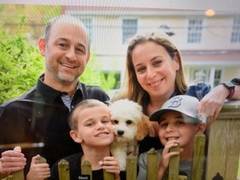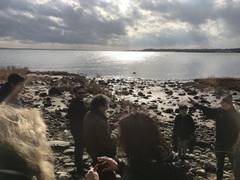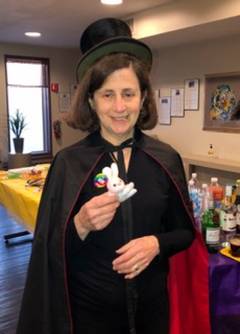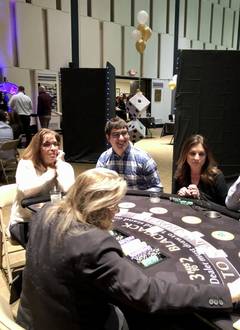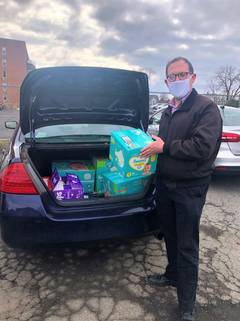Memorial Days (Yom Kippur Morning 5786 2025)
10/03/2025 07:40:37 AM
| Author | |
| Date Added | |
| Automatically create summary | |
| Summary |
On May 27, 2019–Memorial Day–Tony Horwitz collapsed on a Washington, DC sidewalk. Horwitz, a noted journalist and author of books about American history and culture, was in his hometown promoting his latest book on a whirlwind tour that took him to eight cities in seven days. Some passers-by rushed to his assistance. Two ambulances arrived and transported him to a downtown hospital, the same hospital, it turns out, where Tony had been born sixty years earlier. There, Tony was pronounced dead.
Meanwhile, Horwitz’s wife Geraldine Brooks–herself also a noted journalist and Pulitzer Prize-winning author of bestselling novels–was at their home on Martha’s Vineyard, trying to make progress on her next book. The phone rang, and Geraldine answered it: a brief phone call from an overstretched emergency room doctor in DC, calling with news that would turn her life upside down.
“Not Tony. Not him,” thought Brooks. “[Not] my husband, younger than I am–hilarious, bursting with vitality. He’s way too busy living. He cannot possibly be dead.”
A wave of unspeakable grief broke over her. Brooks recalls: “My legs started to shake. But I couldn’t sit down. I paced across the room , feeling the howl forming in my chest. I need to scream, weep, throw myself on the floor, rend my garments, tear my hair. But I couldn’t allow myself to do any of those things. Because I had to do so many other things.”
What followed was a blur: informing friends and relatives, getting herself from the island to DC on a holiday weekend, receiving the deluge of support from her and Tony’s large network of friends.
Years went by. Somehow, Brooks found a way to finish that novel and go on a book tour to promote it, to support her two sons through their own grief for their father, to set up this new, unexpected, and undesired chapter of her life.
But, nearly four years after Tony’s death, Brooks realized that she hadn’t–couldn’t have–taken the time and space to truly grieve for her husband. She writes: “I have erected a facade that I have hidden behind, a fugitive from my own feelings. It’s heavy and elaborate and it’s taken a lot of energy to haul it around with me every time I leave the house.”
And so, in the winter of 2023, Brooks set out on a solo grief retreat of her own devising. She rented a small cabin on a remote island off the coast of her native Australia. There, Brooks–who had embraced Judaism upon marrying Tony–sat a kind of delayed, extended shiva. In the seclusion and raw beauty of the wilderness, Brooks took the time to remember, reflect, and mourn the loss of her husband and the future shared life she had anticipated. What resulted was her recent memoir, called, of course, Memorial Days.
There’s a reason for Brooks’ delayed grieving. As I’ve spoken about before, our culture avoids negative emotions and expects grieving people to just get on with it. But in the case of this sudden, unexpected death, there was simply so much to do to pick up the pieces: dealing with hospitals and medical examiners and funeral homes and rabbis and probate courts and credit cards and health insurance and incompetent accountants and…the bureaucracy of finalizing Tony’s life and establishing her new life as a widow was seemingly endless.
As Brooks writes, “Modern life is a juggling act, and if you don’t keep those flaming torches moving swiftly through the air–if you lose your focus and drop one–the whole stage might catch fire and collapse beneath you.” And Brooks was not prepared to juggle those torches, not practically and not emotionally. Tony’s unexpected, sudden death had caught her off guard, and she scrambled to keep up.
Sudden, unexpected deaths are nothing new, of course. The Talmud compares sudden death to something being snatched away, and says that anything less than five days of illness to allow for mental and practical preparations is abnormal. Indeed, a midrash imagines that our ancestor Jacob, who is the first person the Torah reports to be ill, was in fact the very first person ever to be ill. Jacob’s illness prior to his death was an act of mercy from God, giving him the time to convey blessings and instructions to his sons and grandsons just prior to his death. We needn’t take this teaching literally. But it helps us appreciate how illness, for all its unpleasantness, can help both the dying person and his or her family prepare for what is about to happen. Illness is usually preferable to an alternative world where people would simply die with no warning.
Elsewhere, the Talmud advises preparing burial shrouds for certain groups of people who are prone to sudden death–meitim k’shehen m’saprin, it calls them: people who die in the middle of a conversation, in an unexpected way, with too much left unsaid. I appreciate the pragmatism of this advice: death can happen at any moment, in the middle of many conversations, and we need to be prepared. For me, part of that preparation is making a point of staying in touch with loved ones, ending each conversation in a way that, should this be our final one, I could live with it, knowing that the foundation of love in this relationship has been expressed as fully as I can.
I try to do this because I once saw death end a conversation during my summer as a student hospital chaplain. An elderly woman had just gone through a surgery and was recovering back in her room. She was alert and oriented and chatting with her son. Suddenly, her heart stopped. If you’ve never seen a “code” in a hospital, let me just tell you that it involves an anxious flurry of activity and a crowd of various staff who gather outside to support, including the chaplains. After some time, the doctors concluded there was nothing more to be done and pronounced her dead. Having witnessed this sorry commotion and sudden turn of events, the woman’s son fled the room in a sobbing panic, overwhelmed by the experience of his mother dying literally in the middle of a conversation. He was not prepared.
This specter of sudden death haunts Yom Kippur and this whole process of teshuva, repentance, that is the hallmark of these Days of Awe. As I often remark, Yom Kippur is a manufactured near-death experience, where we try to more clearly perceive the precariousness of life that we usually tune out. And with that awareness, we examine our actions and resolve to make better use of whatever time we do have.
There is a deep connection between the turning, the repentance of this season and the prospect of death. Millenia ago, the ancient sage Rabbi Eliezer instructed his students: “Repent one day before your death!” As good budding rabbis, his students immediately found the logical problem in this instruction. “How,” they asked their teacher, “are we to know the day of our own deaths, such that we can repent just before?”
Rabbi Eliezer smiled: “That’s just it, my friends. You do not know when you will die. So repent today in case you die tomorrow. And then, repent again tomorrow, and the day after. And in doing so, you will live every day engaged in repentance, prepared for the possibility that your life is about to end. You will live each day as best as you possibly can, with as few regrets as possible. You will not leave important matters unsaid or undone. You will not waste your precious life. As I learned from my teacher, Rabban Yochanan ben Zakkai, you will be like a king’s guests who turn up at the palace dressed and ready for a feast, even though you do not know exactly when you’ll be invited in.”
And, so it has always been. We go through these days of awe aware of our fragility, but in a way that powers resolve rather than resignation. We confess our sins and promise to do better precisely because we do not know how much time we have left. We do not want to die in the middle of a conversation, snatched away with unfinished business.
Of course, as Rabbi Eliezer students knew, we cannot predict the timing of our deaths. Toward the end of her grief retreat, Brooks came to accept this as well. One day, she took her late afternoon swim in the ocean a bit later than usual. Since I can’t describe this better than she did, allow me to quote Brooks at length.
She recalls: “I drop beneath the waves. It feels like a mikveh. I dive down, away from all the memories I’ve brought to the surface these past weeks. All the noise, the pain, the nonsense of that time. I let the tug of the waves carry it all away. I come up and face the immensity of ocean. I let the sound form, I let it uncurl like a fern. I howl, emptying my lungs. The sound, loud and raw in this world of silence, is shocking. I let myself sink again, come up and face the blazing colors of the sky. The going down of the sun seems to mark a more final ending than simply a day. This day, any day, could be the last day. We all know that. Now I feel it.”
What a gift, that ocean mikveh, with its opportunity to finally let out years of grief, and to arrive at something approaching acceptance. How important to allow ourselves the time and space to feel and express those feelings.
This year, our community faced a number of unexpected deaths. Some of the deceased were older, some were younger, but all their deaths were unexpected, in a flash, here one moment and gone the next. For me, this was the year I finally faced the scenario I was sort of prepared for in rabbinical school: the unexpected phone call that causes me to drop everything and go to the hospital. In one instance, I was sitting on the couch at home, enjoying a quiet evening while my husband Daniel’s parents were visiting us. A call came to my cell from an unknown number with the terrible news of a congregant’s sudden and unexpected death.
Kevin Heaps was a 39-year old father of three. He and his wife Elisha were relatively new members of the synagogue but had become very involved. I appreciated his dedication to his family, to Judaism, and to his community.
Hearing of Kevin’s totally unexpected death, I channeled my shock into action, which is a bit of a rabbinic privilege: getting dressed, driving to the hospital, finding an after-hours parking spot, and sitting in the emergency room for some time, alternatively grasping for words of consolation, speaking about next steps, and sitting in silence. It is one thing to learn about this in the abstract; it is quite another to sit across from a family who has just experienced an unimaginable loss and be in those terrible feelings of disorientation and pain. Somehow, with the support of many people in this community–other families, our Religious School teachers, our leadership– the family made it through those painful days and weeks following his death.
More recently, I found myself rushing to the hospital again when I received word of the death of another beloved member of our community, Edith Halpern. Edith was active and vibrant and seemed much younger than her 89 years. Edith was actively involved at KTI, but also with the senior program at Community Synagogue, art classes, writing, driving around town in her signature white Mustang convertible, and staying in touch with friends and family all over the world. Edith was elegant and glamorous, always with makeup and a smile on her face.
She was a regular presence at KTI at Shabbat services, adult education classes, and special events. In fact, she had already registered for the daytime adult education class that we began a few weeks ago. I was struck by how open to learning and engaged Edith was. Pretty much every time I saw her, there was some thoughtful question or comment about whatever we were talking about. For instance, about the 23rd Psalm, which we’ll say in a moment. Edith wanted to know: why would God set a table before me in the presence of my enemies? I don’t want to have dinner with my enemies–what kind of comfort is that?
In August, Edith joined us for Shabbat service in our temporary location in the Gantz building. A few days later, she wasn’t feeling well. A reluctant hospital visit quickly escalated and Edith passed away.
Edith’s death shocked her family, who were denied the opportunity to say goodbye, and all of us who knew and loved her. It certainly felt like she died in the middle of a conversation.
At the funeral a few days later, I met Edith’s broader circle of family and friends who came to remember her. “Oh, you’re the rabbi. Edith loved you!” a few of them said to me. All I could say in response was: “the feeling was mutual.”
Later that day, we gathered for shiva at Edith’s longtime home which, as I suspected, was full of a lifetime’s worth of keepsakes and possessions. What I didn’t expect was that the home was also full of something like 200 houseplants, each in its own little vase or pot. Evidently, Edith enjoyed watering them and surrounding herself with their green vitality.
After we finished the shiva minyan, Edith’s daughter suggested that everyone present select a plant to take home. On a practical level, this was a first step in dispersing the many items in that house. But on a symbolic level, it felt like we were each taking a piece of Edith’s legacy. We could no longer lavish her with our care, and be lavished by hers, but we could take care of something that Edith took care of. In some odd way, those plants, which she tended so carefully, were an extension of Edith.
And so, I grabbed this pot off of a table, brought it home, and put it on a windowsill. I do not at all have a green thumb, but I am very determined to not kill this plant. It will be my way to remember Edith.
Unexpected deaths catch us off guard. They rob survivors of an opportunity for closure and force them to scramble to deal with the resulting challenges. Our tradition encourages us to walk through life with the consciousness that each day may be our last, and therefore to not put off the most important work that is ours to do.
While unexpected deaths bring their unique challenges, the truth is that all deaths catch survivors by surprise to some extent. No matter how long or short a loved one’s dying process was, it is never easy to finally reach the end. And so, we remember. We focus our attention for a few moments on trying to keep the memory of those we have lost alive. Like this plant, memory needs care and attention. Like a plant, memory needs to be nourished on a regular schedule. And so, we turn to Yizkor, where we pause on this sacred day to water the thirsty plants of memory.
Tue, October 21 2025
29 Tishrei 5786
Photo Gallery
Photo Albums
Upcoming Events
-
Wednesday ,
OctOctober 22 , 2025Rabbi, May I? Modern Responsa
Wednesday, Oct 22nd 10:00a to 11:30a
Wednesdays, 10 - 11:30 AM, KTI Library Ever since Abraham’s famous argument with God, Judaism has been full of debate. Moses and Korah, David and Nathan, Hillel and Shammai, the Vilna Gaon and the Ba’al Shem Tov, Spinoza and the Amsterdam Rabbis . . . the list goes on. No wonder that Judaism cherishes the expression machloket l’shem shamayim, “an argument for the sake of heaven.” Beyond their historical importance, what makes these disputations so compelling is that nearly all of them, regardless of their epochs, are still being argued. The parade of characters spanning three millennia of biblical, rabbinic, and modern disputation reflects the panorama of Jewish history with its monumental political, ethical, and spiritual challenges. This series will examine Jewish responses to exile from the biblical period to our modern day. Considering texts from all genres of Jewish literary creativity, we will explore how the realities and iterpretaions Join as we re-open these timeless debates that lead us to the core of 3,000 years of Jewish conversation. • Justice: Abraham vs. God (October 19) • Holiness and Authority: Moses vs. Korah (November 9) • Inclusion: The Five Daughters vs. the Twelve Tribes (November 30) • Accountability and Morality: David vs. Nathan (December 21) • Resistance: Ben Zakkai vs. the Zealots (January 18) • Law: Hillel vs. Shammai (February 15) • Spirituality: The Vilna Gaon vs. the Baal Shem Tov (March 15) • Boundaries: Spinoza vs. the Amsterdam Rabbis (April 19) • Religious Evolution: Geiger vs. Hirsch vs. Frankel (May 10) • Zionism: Herzl vs. Wise (May 31) -
Wednesday ,
OctOctober 22 , 2025Wrestling with God
Wednesday, Oct 22nd 8:00p to 9:30p
Wrestling with God Wednesdays, 8-9:30 PM Congregants’ homes TBA We need to talk about God. And about how we talk, and don’t talk, about God. It’s a big topic, maybe the biggest. This offering invites adult learners into compassionate inquiry, deepening their relationship to Jewish text through collective exploration. Using the album s*ngs ab-ut g?d [https://open.spotify.com/album/6JEY2AN6awAxNfWwmXX460] by Jewish educator Eliana Light as a starting point, this series blends music, Hebrew text study, and open-ended questions to help participants examine their own connections to the divine. This is sacred work. It’s not about getting it right. It’s about showing up with curiosity, humility, and a willingness to join the long lineage of Jews who wrestle with God. Each session stands alone, but we’d love to have a consistent group as much as possible. Dates: September 10: skyman October 22: shadows November 19: in the silence December 10: if only January 21: lead me back February 11: three steps March 11: beyONEd April 29: the mountains May 20: the name June 17: I rise -
Thursday ,
OctOctober 30 , 2025Coffee with the Rabbi
Thursday, Oct 30th 8:00a to 9:00a
Start your morning with some caffeine and casual or meaningful conversation! Join Rabbi Goldberg for a Coffee Chat! Stop by Rye Ridge Starbucks any of the following Thursdays, between 8-9am: June 12 and 26 July 10 and 24 August 7 and 21 September 4 and 18 October 16 and 30 November 6 and 20 December 4 and 18 -
Saturday ,
NovNovember 1 , 2025Dror Israel Shabbat
Shabbat, Nov 1st 11:30a
Dror Israel Shabbat Dror Israel’s Mirit Sulema, along with two leaders of the Arab Youth Movement NOAL, Tal Tunik and Shadi Habiballa, will speak during a Kiddush lunch about their important work with Arab Israeli youth and bringing Jewish, Arab, and Druze youth together. Saturday, November 1st, approx. 11:30am KTI Social Hall "We eat together, laugh together. We talk about what we think of each other, and what will help bring peace.” RSVP Appreciated -
Saturday ,
NovNovember 1 , 2025KTI Gala - A November to Remember Digital Journal
Motzei Shabbat, Nov 1st 7:00p to 10:00p
Privacy Settings | Privacy Policy | Member Terms
©2025 All rights reserved. Find out more about ShulCloud

